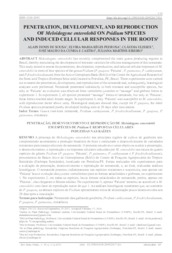Penetration, development, and reproduction of Meloidogyne enterolobii on Psidium species and induced cellular responses in the roots.
Penetration, development, and reproduction of Meloidogyne enterolobii on Psidium species and induced cellular responses in the roots.
Author(s): SOUSA, A. D. de; PEDROSA, E. M. R.; ULISSES, C.; CASTRO, J. M. da C. e; RIBEIRO, J. M.
Summary: Meloidogyne enterolobii has severely compromised the main guava producing regions in Brazil, thereby stimulating the development of resistant varieties for efficient management of this nematode. This study aimed to assess the penetration, development, reproduction, and induced cellular responses of M. enterolobii in roots of four species of the genus Psidium (P. guajava ?Paluma?, P. guineense, P. cattleyanum, and P. friedrichstalianum) from the Active Germplasm Bank (BAG) of the Center for Agricultural Research of the Semi-arid Tropics (Embrapa Semi-arid) located in Petrolina, PE, Brazil. Three experiments were carried out to assess the penetration, development, and reproduction of the nematode and, subsequently, histological analyses were performed. Nematode penetrated indistinctly in both resistant and susceptible species, but only in ?Paluma? an evolution was observed from vermiform juveniles to ?sausage? and globose forms in experiment 1. In experiment 2, all species presented ?sausage? forms of nematode, but only in ?Paluma?, these forms reached adult female stages. In experiment 3, only ?Paluma? was susceptible to M. enterolobii, with reproduction factor above unity. Histological analyses showed that, except for P. guajava, the other Psidium species presented poorly developed feeding sites at 20 days after inoculation.
Publication year: 2017
Types of publication: Journal article
Unit: Embrapa Semi-arid Region
Observation
Some of Embrapa's publications are published as ePub files. To read them, use or download one of the following free software options to your computer or mobile device. Android: Google Play Books; IOS: iBooks; Windows and Linux: Calibre.
Access other publications
Access the Agricultural Research Database (BDPA) to consult Embrapa's full library collection and records.
Visit Embrapa Bookstore to purchase books and other publications sold by Embrapa.

